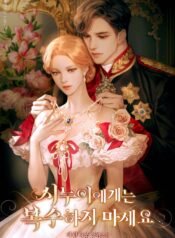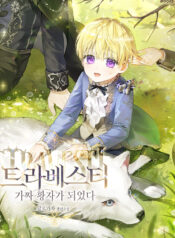She only wished for her daughter to live a life of happiness and tranquillity, much like the life Ellaria herself had chosen. Though Mirabella had impulsively conceived the child of the Emperor of Solerium before their marriage, Ellaria’s only wish was for her daughter to flourish as a mother and embrace the splendour of her new life.
So when Mirabella left to become Empress of the distant Empire of Solerium, Ellaria gave her blessing. Standing resolutely by Ellaria’s side were her two sons: the eldest, destined to inherit the throne of Dale, and the younger, destined to serve as Marquis, guarding the kingdom’s borders. Both were strong and bore an uncanny resemblance to their father in his younger days.
And so, before entering the carriage, young Mirabella, wearing the veil of a future empress, wiped her tearful eyes, unable to meet her father’s gaze. Her father, colder and more beautiful than the frost of a northern dawn, watched her with tear-filled eyes – a man who had to see his daughter, who already carried the child of a neighbouring emperor, go off to marry.
“My father… crying…”
Even as Mirabella smiled in her husband’s arms, the grief etched on her face had a clear cause.
“May your life be filled with joy and abundance. May glory and peace follow you always.”
Father, how wonderful it would have been if your blessing had come true. If my life had truly been as kind and peaceful as You wished… how happy I could have been.
Twenty-seven years passed in Solerium. The young son she had conceived in her homeland had grown into a full-blooded Imperial Prince.
Mirabella carried her father’s blessing with her all her life. But… the royal house of Solye in the sacred Solerium shared historical and racial ties with the kingdom of Dale. They were descendants of Arnor, the great land of knights. Their son was a reflection of their heritage.
Deep black hair, eyes like blue glass and sun-bronzed skin, strong and firm. He was very different from their second son, whose golden locks and radiant summer beauty radiated warmth and light.
The second pillar of Solerium, her second son, Calyps, inherited her gleaming platinum hair and waxy white skin, but his sharply defined features were entirely his father’s.
Unlike her second son, whose vibrant beauty matched his carefree and warm nature, her eldest was the embodiment of a wall of ice. Eternal frost, eternal snow. A man forged from blades and shards, as if a god had breathed life into jagged, broken steel.
Not a reflection of her husband, but of her father – a proud and selfish thornbush. Her eldest son was his grandfather reincarnated. Perhaps it was because the foundations of Solerium and Dale were so similar. The eldest believed that nothing soft or sweet in the world could surpass the hard edge of a burnt blade. This man was their firstborn.
Atlion.
A prince of noble blood who treated wounds and scars as trivial. A man who, even upon hearing of his father’s death, showed no sign of emotion – not even a furrowed brow. Her son… the one who announced that he would take his father’s place as ruler. That moment was the worst day of Mirabella’s life. For, for…
“Traces of poison were found in the heart medicine His Majesty had taken.”
They said he had fallen from the saddle as soon as he had mounted. Her husband’s stallion was a gentle and intelligent animal, loyal only to him. There was no reason for the horse to throw him – especially during a hunt.
The Emperor, her husband, her Ruslan… had never fallen from a horse. He was a knight and an extraordinary horseman. There was no way he could have mishandled the reins and fallen. Mirabella knew this. She knew him, so she couldn’t believe he was dead. And yet…
“Simon de Lamallac!”
There is only one person who stands to gain from Ruslan’s death. And only one who has long awaited it.
As Mirabella clung to the shadow of her deceased husband, waiting for death within the burning tower, someone draped a red cloth over her head while she whispered her father’s blessing like a talisman.
She clutched her saviour’s broad shoulders and thick bones with a force that felt as if it could crush her, and whispered hoarsely. The tower of the Summer Palace was steep and dangerous. There was only one knight who could climb the burning tower: her father.
Her face streaked with tears, Mirabella reached out and caressed the face of the man who could only be her father.
She gripped the broad shoulders and strong bones tightly, as if they might break under her grasp, and whispered softly. The tower of the summer palace was tall and steep, and if anyone could scale the blazing tower, it could only be her father. Mirabella wiped her tear-streaked, wet face and gently caressed the face she was certain belonged to her father.
“Father….”
At that moment, the man holding her jumped out of the window. When she opened her eyes, it wasn’t her father but her son who had carried her through the window, looking down at her with pleading eyes. Across her son’s features, the outline of her father seemed to flicker and overlap.
‘If only I could have been happy forever, like my father wanted me to be.’
How wonderful it would have been. A hundred days had passed since her husband’s death. Mirabella could still see his face, clutching his chest on the saddle. That beautiful face, pale and trembling like an aspen leaf in the wind.
She clung to her son, who cried out with tear-filled eyes.
“Mother!”
Then everything became a blur.
Calyps, who had been studying in Dale, rushed back to stay by Mirabella’s bedside. It wasn’t until one hundred days had passed that she finally saw the backs of her two sons as they prepared for their father’s funeral. Suddenly, her gaze met Atlion’s, and her lips trembled faintly, as if she wanted to say something but couldn’t find the words.
Her son approached and gently held Mirabella’s cheeks. For a moment, she rested her head against his chest, quietly steadying her breath. Atlion looked down at his mother, who seemed so fragile, as if she could shatter with the slightest breeze. As he gazed at her, memories of his late father came flooding back to Atlion’s mind.
Even after his body was laid to rest, her father found no peace in the crypt beneath the Imperial Palace. Those responsible for his death – Simon de Lamallac and his adopted son Ronan de Lamallac – were like scheming rats. The Empire was on the brink of civil war.
In the western regions of Solerium, the rebellious Lamarlac forces were advancing on the capital.
Mirabella, tracing the seal of her late husband Ruslan across his cold, lifeless fingers, looked up at her eldest son in full armour. Having been imprisoned in a tower by Simon and later rescued by her son, Mirabella was often in a state of confusion.
No, it wasn’t just “often”. Sometimes she mistook her son, Atlion, for her own father. She would cling to him, crying and begging him to take her back to Dale.
Atlion, unable to separate his mother from her delusions, would whisper softly, “I am the son you conceived that night in your homeland. His soft words would inexplicably bring her peace. Like dying embers fading to ashes, her hysteria would fade and she would look at him with cold, distant eyes.
A month after his father was laid to rest in the crypt, Atlion turned away from his mother and headed for the battlefield.
The battlefield… the battlefield was hell. Flames and arrowheads, allied swords and enemy shields, all collided in a maelstrom that dragged the living into the grasp of death.
Simon de Lamallac was a seasoned veteran, deeply rooted in the history of Solerium, while his adopted son was a man whose passion for war bordered on madness. At times, Atlion found it an overwhelming burden to simply endure their existence.
Day after day he fought, enduring as if his very survival was a victory. Then came the day when he finally cornered the enemies who had wronged his father and drove them back to the walls of the fortress. But even cornered rats are said to show their teeth.
By the time he realised it was a trap, it was too late. From dawn, the clash of swords echoed relentlessly as body after body fell. For once, Atlion found himself retreating behind his shield. His armour was covered with signs of destruction – scorched and drenched in blood, a grim testament to the brutal chaos of the battle.
A blade sliced through his side. Someone called his name, but he couldn’t make out the words. Since he had not formally succeeded his father, they must have called him “Sir Atlion” or “Your Highness”. His ears rang, and the realisation that he had exposed himself to the enemy hit him harder than the wound itself.
The pain was excruciating, as if his body would break apart. Staggering, he retreated a few steps, struggling to keep himself upright. How had he managed to charge forward at all? Again and again he left himself open to attack, his pride burning so fiercely that he clenched his teeth until his gums hurt.
He had thought the end was near. All that remained, he thought, was to hang the heads of his father’s murderers – the ones who had thrown the Empire into chaos – on the walls of the fortress. But then he fell. A complete and devastating fall. As he stood on the brink of death, everything felt empty and meaningless.
All that was left was an overwhelming sense of emptiness. It had been a complete and devastating failure. He thought he would never open his eyes again. But as night turned to morning, he awoke with no memory of what had happened.
Grand Duke of Tessen, also known as the Black Prince. Sir Atlion, eldest son of the Emperor and Empress of Solerium and Supreme Commander of the Imperial Army. It has been over ten days since Atlion disappeared into the Dark Mountains. Upon the Prince’s disappearance, Duke Calyps of Riveau immediately assumed the roles of Regent and Supreme Commander, leading search parties into the mountains.
Desperation was written all over the face of the man leading the search. In ten days, they had recovered only a few of the prince’s personal belongings. It was hard to say if that was any consolation. The absence of a body and the recovery of only scattered objects left a conflicting mixture of relief and grief.
But even that was short-lived. Brief moments of hope and despair came and went in cycles, offering no real comfort. In the end, the prince was nowhere to be found. Even as the search parties withdrew, leaving only a few to continue the mission, their prayers turned to a desperate plea: “At least let us recover his body.”
The pressure on Calyps to ascend the throne grew more relentless with each passing day. By the time a year had passed since the search began, the Privy Council had given up all hope of the Crown Prince’s survival. His death was now accepted as inevitable.
Calyps gazed silently at the golden laurel crown, the emblem of Solerium’s emperor. His mother, the Empress, had a vacant, distant look in her eyes. Unlike her eldest son, she did not call her second son “father”, nor did she mistakenly refer to him as “husband”.
The next day, Calyps was proclaimed Regent Emperor. There were murmurs that the Crown Prince might return to the Imperial Palace of his own accord, a fragile hope offered as an excuse. But no one really believed those words. Faith seemed futile and hope unattainable. In time, it was expected that Calyps would no longer be a mere regent, but the full emperor that everyone believed was inevitable.
—
The wind was sharp and cold. Swan’s belly swelled with each passing day, undeniable proof that her pregnancy had not been a lie. It couldn’t have been a lie. Swan was both a skilled herbalist and a woman.
Women were by nature deeply attuned to the changes in their bodies. A woman could instinctively feel when a man’s essence changed from a simple seed to the beginning of life. Swan, too, felt it without a doubt.
During the previous autumn and winter, Atlion often found himself staring at Swan’s belly. Despite her claims to be pregnant, her belly showed little sign of growth. While he understood that pregnancy didn’t lead to immediate birth, the idea of her carrying a child felt surreal, and his disbelief often drew his gaze back to her belly.
It was during this time that Atlion’s memories returned. One rainy evening, as leaves carried by the rainwater brushed against his feet, his memories resurfaced – unexpected and inconspicuous, like a fleeting touch. It was almost absurd in its simplicity, even laughably anticlimactic. The scattered fragments of his memories came together naturally, forming a complete picture without any effort on his part.






